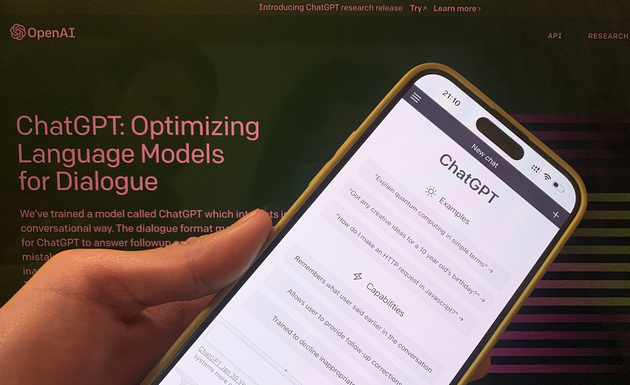
Photo/Liu Xuemei (NBD)
On March 5th, OpenAI published a blog post on its official website stating that the company's mission is to ensure that AGI benefits all of humanity, and refuting all of Musk's allegations.
The blog post publicly discloses the relationship between OpenAI and Musk, and exposes 4 emails between Musk and three important founders of OpenAI: Sam Altman, Greg Brockman, and Ilya Sutskever.
The emails show that Musk agreed to OpenAI establishing a for-profit organization and that it would not be fully open.
Previously, Elon Musk sued ChatGPT maker OpenAI and its CEO Sam Altman on February 29th, alleging that they violated the company's original mission of developing artificial intelligence for human well-being rather than profit. The lawsuit also mentions that the company has kept its most advanced artificial intelligence model, GPT-4, "completely confidential".
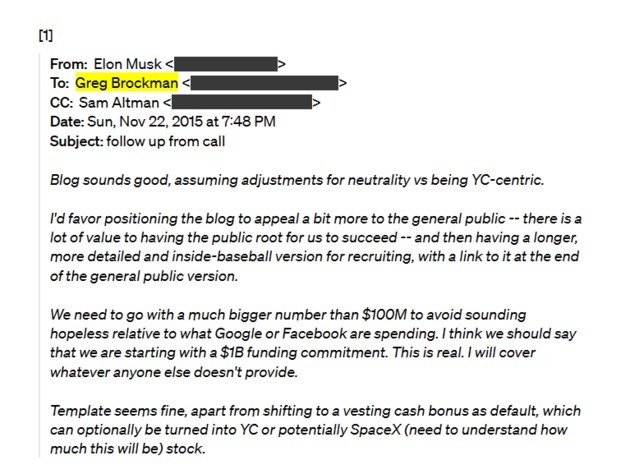
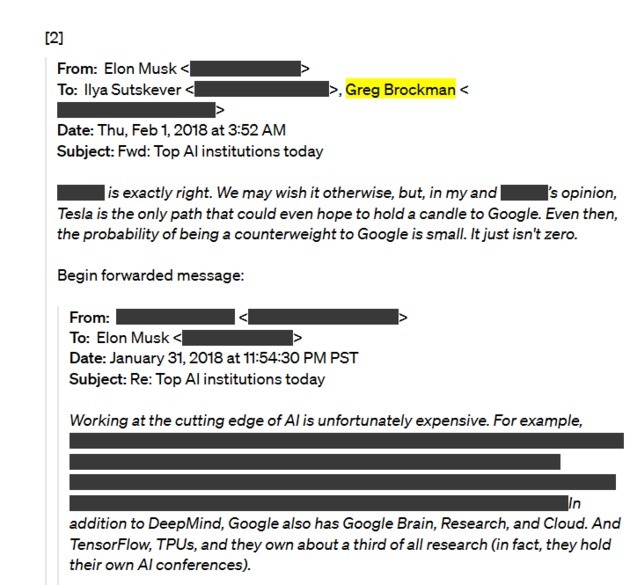
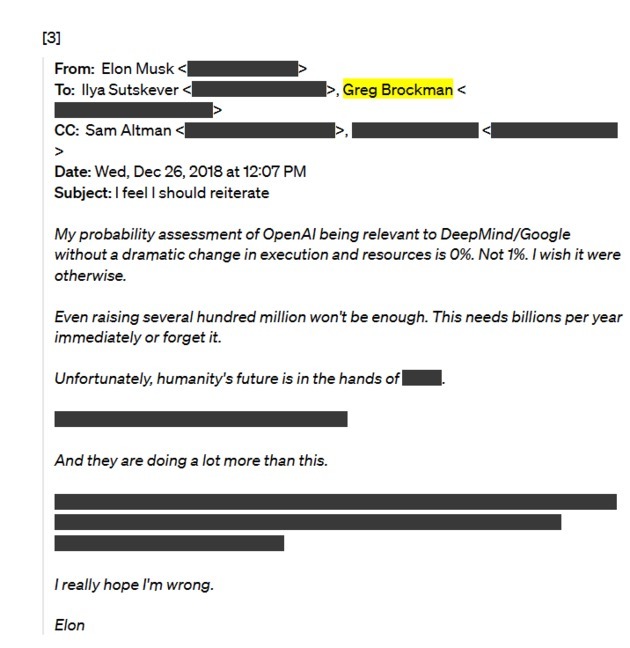
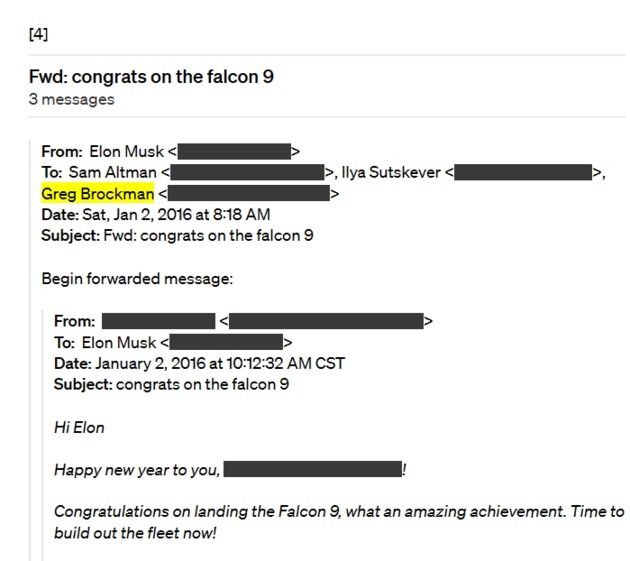
Here is the full text of the OpenAI blog post, titled "OpenAI and Elon Musk":
The mission of OpenAI is to ensure AGI benefits all of humanity, which means both building safe and beneficial AGI and helping create broadly distributed benefits. We are now sharing what we've learned about achieving our mission, and some facts about our relationship with Elon. We intend to move to dismiss all of Elon’s claims.
We realized building AGI will require far more resources than we’d initially imagined
Elon said we should announce an initial $1B funding commitment to OpenAI. In total, the non-profit has raised less than $45M from Elon and more than $90M from other donors.
When starting OpenAI in late 2015, Greg and Sam had initially planned to raise $100M. Elon said in an email: “We need to go with a much bigger number than $100M to avoid sounding hopeless… I think we should say that we are starting with a $1B funding commitment… I will cover whatever anyone else doesn't provide.”
We spent a lot of time trying to envision a plausible path to AGI. In early 2017, we came to the realization that building AGI will require vast quantities of compute. We began calculating how much compute an AGI might plausibly require. We all understood we were going to need a lot more capital to succeed at our mission—billions of dollars per year, which was far more than any of us, especially Elon, thought we’d be able to raise as the non-profit.
We and Elon recognized a for-profit entity would be necessary to acquire those resources
As we discussed a for-profit structure in order to further the mission, Elon wanted us to merge with Tesla or he wanted full control. Elon left OpenAI, saying there needed to be a relevant competitor to Google/DeepMind and that he was going to do it himself. He said he’d be supportive of us finding our own path.
In late 2017, we and Elon decided the next step for the mission was to create a for-profit entity. Elon wanted majority equity, initial board control, and to be CEO. In the middle of these discussions, he withheld funding. Reid Hoffman bridged the gap to cover salaries and operations.
We couldn’t agree to terms on a for-profit with Elon because we felt it was against the mission for any individual to have absolute control over OpenAI. He then suggested instead merging OpenAI into Tesla. In early February 2018, Elon forwarded us an email suggesting that OpenAI should “attach to Tesla as its cash cow”, commenting that it was “exactly right… Tesla is the only path that could even hope to hold a candle to Google. Even then, the probability of being a counterweight to Google is small. It just isn’t zero”.
Elon soon chose to leave OpenAI, saying that our probability of success was 0, and that he planned to build an AGI competitor within Tesla. When he left in late February 2018, he told our team he was supportive of us finding our own path to raising billions of dollars. In December 2018, Elon sent us an email saying “Even raising several hundred million won’t be enough. This needs billions per year immediately or forget it.”
We advance our mission by building widely-available beneficial tools
We’re making our technology broadly usable in ways that empower people and improve their daily lives, including via open-source contributions.
We provide broad access to today's most powerful AI, including a free version that hundreds of millions of people use every day. For example, Albania is using OpenAI’s tools to accelerate its EU accession by as much as 5.5 years; Digital Green is helping boost farmer income in Kenya and India by dropping the cost of agricultural extension services 100x by building on OpenAI; Lifespan, the largest healthcare provider in Rhode Island, uses GPT-4 to simplify its surgical consent forms from a college reading level to a 6th grade one; Iceland is using GPT-4 to preserve the Icelandic language.
Elon understood the mission did not imply open-sourcing AGI. As Ilya told Elon: “As we get closer to building AI, it will make sense to start being less open. The Open in openAI means that everyone should benefit from the fruits of AI after its built, but it's totally OK to not share the science...”, to which Elon replied: “Yup”.
We're sad that it's come to this with someone whom we’ve deeply admired—someone who inspired us to aim higher, then told us we would fail, started a competitor, and then sued us when we started making meaningful progress towards OpenAI’s mission without him.
We are focused on advancing our mission and have a long way to go. As we continue to make our tools better and better, we are excited to deploy these systems so they empower every individual.


 川公网安备 51019002001991号
川公网安备 51019002001991号





